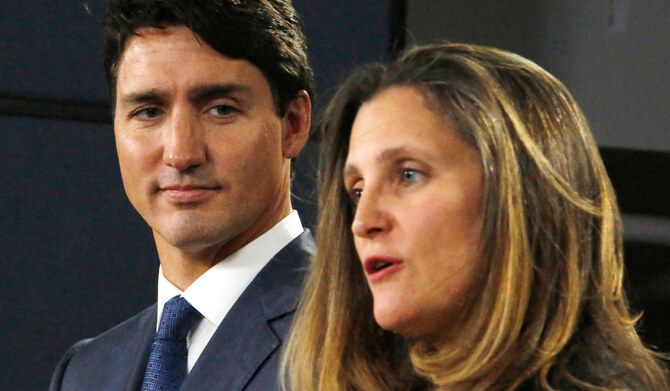OTTAWA: Canada's Deputy Prime Minister Chrystia Freeland quit Monday in a surprise move after disagreeing with Justin Trudeau over US President-elect Donald Trump's tariff threats.
The resignation of Freeland, 56, who also stepped down as finance minister, marked the first open dissent against Prime Minister Trudeau from within his cabinet, and may threaten his hold on power.
Liberal leader Trudeau lags 20 points in polls behind his main rival, Conservative Pierre Poilievre, who has tried three times since September to topple the government and force a snap election.
"Our country today faces a grave challenge," Freeland said in her resignation letter to Trudeau, pointing to Trump's planned 25 percent tariffs on Canadian imports.
"For the past number of weeks, you and I have found ourselves at odds about the best path forward for Canada."
First elected to parliament in 2013, the former journalist joined Trudeau's cabinet two years later when the Liberals swept to power, holding key posts including trade and foreign minister, and leading free trade negotiations with the EU and the United States.
Most recently, Freeland had been tasked with helping lead Canada's response to the incoming Trump administration. As the first woman to hold the nation's purse strings, she had also been tipped as a possible successor to Trudeau.
Canada's main trading partner is the United States, with 75 percent of its exports each year going to its southern neighbor.
Trudeau flew to Florida last month to dine with Trump at Mar-a-Lago and try to head off the tariff threat, but nothing yet indicates Trump is changing his position.
In her resignation letter, Freeland said Trudeau wanted to shuffle her to another job, to which she replied: "I have concluded that the only honest and viable path is for me to resign from the cabinet."
She said the country needed to take Trump's tariffs threats "extremely seriously."
Warning that it could lead to a "tariff war" with the United States, she said Ottawa must keep its "fiscal powder dry."
"That means eschewing costly political gimmicks, which we can ill afford," she said, in an apparent rebuke of a recent sales tax holiday that critics said was costly and aimed at bolstering the ruling Liberals' sagging political fortunes.
Dalhousie University professor Lori Turnbull called Freeland's exit "a total disaster."
"It really shows that there is a crisis of confidence in Trudeau," she said. "And makes it much harder for Trudeau to continue as prime minister."
Until now, the cabinet has rallied around Trudeau as he faced pockets of dissent from backbench MPs, noted Genevieve Tellier, a professor at the University of Ottawa.
But Freeland's rejection of his economic policies poses "a big problem," she said, and shows his team is not as united behind him as some thought.
One by one, ministers trickled out of a cabinet meeting Monday past a gauntlet or reporters shouting questions. Some shouted back that they had "confidence in the prime minister," but most, looking solemn, said nothing.
Freeland's departure came just hours before she was scheduled to provide an update on the nation's finances, amid reports the government would blow past Freeland's deficit projections last spring.
"We simply cannot go on like this," Poilievre said. "The government is spiraling out of control... at the very worst time."
Housing Minister Sean Fraser, who also announced Monday he was quitting federal politics, described Freeland as "professional and supportive."
One of her closest friends and allies in cabinet, Anita Anand, told reporters: "This news has hit me really hard."
Freeland said she would run for reelection in the country's next parliamentary polls. A vote is scheduled to be held in October 2025 at the latest, but most analysts believe it will come sooner.
Trudeau has indicated that he plans to lead the Liberals into the next election.
Some local media suggested he might step down after Freeland's exit, but his office flatly rejected the reports as "absolutely not accurate."
























